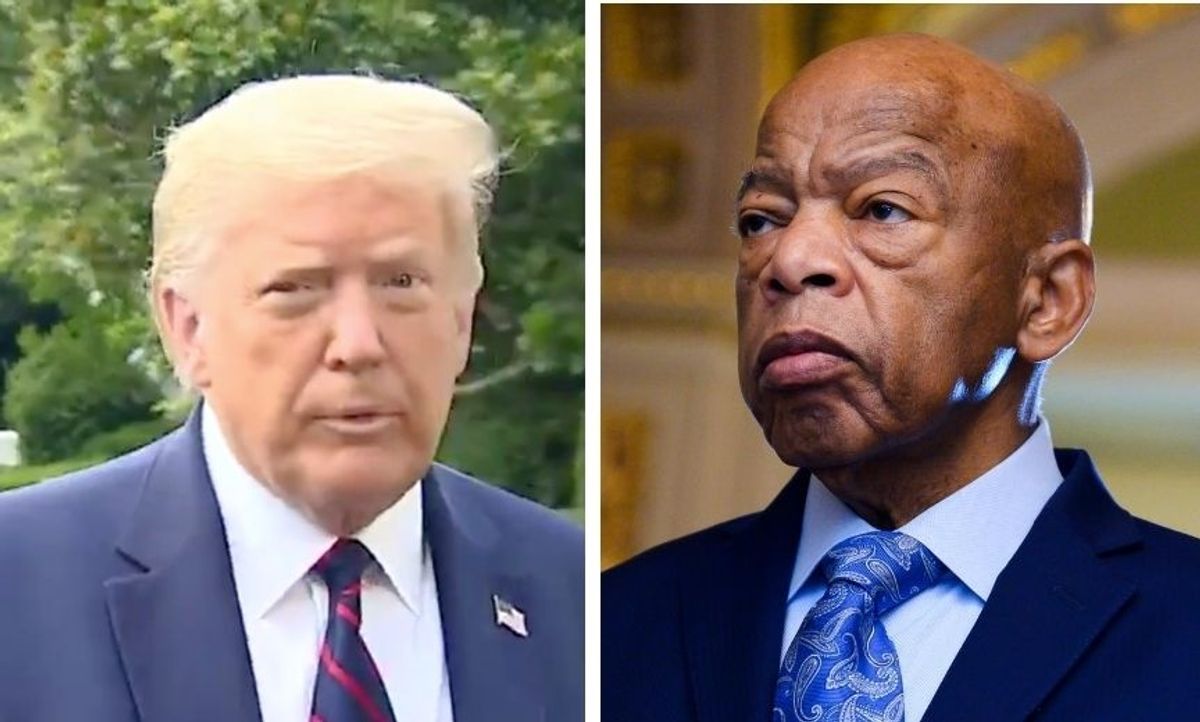The United States is mourning the loss of Congressman John Lewis (D-GA), a veteran civil rights icon and activist, who passed away on July 17.
Lewis was a leader in the Student Nonviolence Coordinating Committee during the Civil Rights Movement of the 1960s, where he participated in the Freedom Rides and faced beatings and arrests from southern police officers.
The Congressman's final public appearance was spent in solidarity with protestors in DC's Black Lives Matter plaza, and on Monday, he became the first Black lawmaker to lie in state in the Capitol rotunda—one of the nation's highest honors.
President Donald Trump was asked if he'd be paying respects to Lewis while his body lies in state.
Here's how that went.
Reporter: “Do you plan on paying your respects to Congressman Lewis either today or tomorrow at the Capitol?" Trum… https://t.co/txJnzk6MoZ— Lindy Li (@Lindy Li) 1595876922.0
Trump said:
"No, I won't be going. No."
The President didn't elaborate on why he wouldn't be going. Though he tweeted condolences for Lewis after news of his death broke and lowered flags to half staff for a day, the two frequently clashed.
Lewis was a vocal critic of Trump and famously boycotted his inauguration in 2017. This prompted Trump to tweet multiple times about Lewis's absence, criticizing the Congressman's district in Atlanta, Georgia and implying that Lewis was passive against violent crimes.
People thought Trump's answer revealed a lot about his character.
@jimsciutto It's consistent with his lack of character, ability to put his ego aside and racism.— EM (@EM) 1595874255.0
@jimsciutto Hoping he listened to John Lewis words in the rotunda today. If he has he should be ashamed of his actions— Susan Abbott (@Susan Abbott) 1595874755.0
@jimsciutto @PaulaChertok Trump has no respect with which to pay. It's as simple as that.— Anne Clayton (@Anne Clayton) 1595874291.0
@jimsciutto Why does everyone keep expecting someone who has shown who they are for over 40 years to change? We are… https://t.co/bZoOwFTPjN— Judy Scott ⚖️🌊 (@Judy Scott ⚖️🌊) 1595874686.0
Then again, considering Lewis's stance on Trump and his presidency, perhaps Trump staying away was for the better.
@jimsciutto He doesn't qualify to be in the same room.— Bullsnitty (@Bullsnitty) 1595873960.0
@jimsciutto @HC_Richardson His inability to feel empathy or recognize greatness in others would result in anything… https://t.co/VqkALAPnuj— Linda Allen (@Linda Allen) 1595874620.0
@jimsciutto Good. Who on earth would want the Racist in Chief there? Trump's presence would tarnish and dishonor… https://t.co/xhtaResMLw— HawaiiDelilah™ (@HawaiiDelilah™) 1595879471.0
With decades of activism and organizing under his belt, Lewis often encouraged young people to "find a way to get in the way" of systems of injustice, and encouraged them to get into what he called "good trouble."
People commemorated his life's work, and urged others to do the same by reinstating a key part of the Civil Rights Act that was struck down in 2013.
Police officers beat Lewis and other Civil Rights protesters in the 1960s for organizing a march in support of the Voting Rights Act. The attacks, which occurred in Selma, Alabama on the Edmund Pettus Bridge, are now remembered as "Bloody Sunday."
Powerful moment in our history. Rep. John Lewis’ casket crossed Edmund Pettus Bridge along the same route he marche… https://t.co/K8DufcSm9T— Ben Crump (@Ben Crump) 1595870016.0
Senate Majority Leader Mitch McConnell (R-KY), who commemorated Lewis in the Capitol, is facing added pressure to take up the legislation passed by the House to restore the Voting Rights Act.
Hearing reports @senatemajldr will speak at #JohnLewis Memorial Service. I can think of no better way for McConnell… https://t.co/EAZcDzhU86— Ana Navarro-Cárdenas (@Ana Navarro-Cárdenas) 1595871831.0
John Lewis presided over the House vote to restore the Voting Rights Act. Mitch McConnell has had that legislation… https://t.co/8KvwkdKLyB— Elizabeth Warren (@Elizabeth Warren) 1595111138.0
Seeing Mitch McConnell speaking at John Lewis' funeral and knowing that he's refusing to bring the Voting Rights Ac… https://t.co/ImtEXc814t— Covie (@Covie) 1595873809.0
The Voting Rights Act restoration bill has now been named in the Congressman's honor.
UPDATE: Former Vice President and 2020 Democratic nominee Joe Biden visited the Capitol with his wife, Dr. Jill Biden, to pay respects to the late Congressman. Vice President Mike Pence is also expected to pay respects in the rotunda.
https://t.co/k3ns4kh7tP— Acyn Torabi (@Acyn Torabi) 1595885782.0
 SECONDNEXUS
SECONDNEXUS percolately
percolately georgetakei
georgetakei comicsands
comicsands George's Reads
George's Reads








